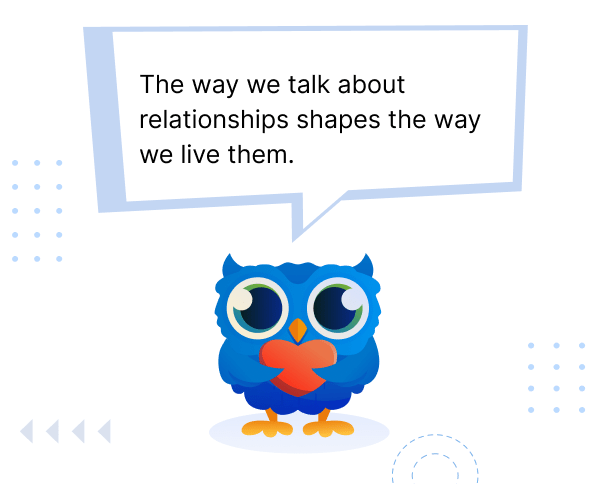Relationships shape the way we think, grow, and connect. They help define personal growth, build our ability to communicate effectively, and test how we handle pressure. Yet even the strongest romantic relationships run into questions worth discussing.
This guide offers relationship topics that invite challenge, curiosity, and reflection. Whether you’re in a new relationship or a long-standing one, a conversation about future plans, mental health, queer history, or conflict resolution can shift your understanding of being on the same page. Good discussions don’t always end in agreement, but should open space for mutual respect and clarity.
The list here covers tough and tender ground, from workplace romances to navigating power dynamics, from same-gender partnerships to intergenerational relationships.
Want to go deeper? Mix in a question about body language or start a deep conversation about career ambitions or financial stress. Try not to settle for surface talk. Emotional connection grows in silence just as much as in speech — don’t rush it.
Want a sharper angle? See debatable psychology paper topics that open doors to more intense relationship dynamics — ideal for class debates, partner talks, or group chats.

Category Overview: Types of Relationship Debates
Before diving in, here’s how the 130+ topics are organized to suit different needs and moods:
- 🧠 General Relationship Debates
Explore everyday challenges, long-distance love, gender dynamics, and philosophical questions about love and connection. Perfect for deeper conversations or emotional check-ins.
- 🔥 Controversial Relationship Questions
Tackle sensitive or polarizing issues like cheating, unhappy marriage, power imbalances, or marriage roles. Ideal for partners ready for honest, bold talks.
- 😂 Light and Fun Relationship Debates
Playful prompts about food, pop culture, and couple quirks — great for dates, bonding, or breaking awkward silences.
Use this structure to choose the right kind of discussion based on your goals, emotional safety, or the setting (private talk, group debate, classroom, etc.).
130 Topics to Debate About Relationships
Long-Distance Relationship Topics to Debate
Debate whether distance really tests love — or just exposes weak foundations.
- Can long-distance love outlast in-person attraction?
- Should couples set end-dates for long-distance periods?
- Is digital intimacy equal to physical connection?
- Are virtual anniversaries meaningful?
- Should texting be constant or limited?
- Does trust matter more in a long-distance relationship?
- Can you grow apart while growing personally?
- Do long-distance couples face more or fewer relationship conflicts?
- Should you avoid visiting each other too often?
- Do reunions erase months of emotional distance?
Controversial Topics in Relationships
Tackle taboo issues like jealousy, infidelity, or open relationships. These controversial relationship topics spark powerful exchanges.
- Should partners share passwords?
- Is emotional cheating worse than physical cheating?
- Can love survive betrayal?
- Should couples discuss past partners?
- Is polyamory a valid form of commitment?
- Can jealousy ever be healthy?
- Should flirting outside the relationship be tolerated?
- Can a lack of intimacy justify an affair?
- Should friends be prioritized over romantic partners?
- Can controversial values lead to relationship conflicts?
Controversial Topics About Relationships
Socially charged topics include feminism in relationships, gender roles, and online cheating. These topics stir real passion and help unpack deep perspectives, making them great for hot relationship topics to discuss.
- Are traditional gender roles outdated?
- Can online flirting count as cheating?
- Should both partners work full-time?
- Is feminism compatible with romance?
- Should men express more emotion?
- Are women expected to nurture unfairly?
- Can dating strategies affect sexual roles?
- Should partners challenge each other’s values?
- Can online influence erode real relationships?
- Are societal norms still shaping modern relationships?
Couples Debate Topics
Includes everyday dilemmas: chores, phone-checking, or emotional labor. Great for practicing respectful dialogue on relationship topics for discussion.
- Who should manage the money?
- Should chores be split evenly?
- Is it okay to check each other’s phones?
- Can emotional labor be measured?
- Who decides what counts as quality time?
- Do shared hobbies matter more than love languages?
- Can one person be too private?
- Should apologies come with explanations?
- Can silence be a form of communication?
- Do couples need shared future goals?
Interesting Debatable Relationship Questions
Engaging, scenario-based prompts to provoke thoughtful exchanges between partners or peers. One example: “Should you always forgive a lie in love?”
- Should honesty always be blunt?
- Can secrets protect a relationship?
- Is timing more important than intent?
- Should one apologize for being misunderstood?
- Are routine arguments a red flag?
- Is curiosity about an ex unhealthy?
- Can values change with love?
- Should each partner have a personal therapist?
- Can love exist without admiration?
- Do relationship debate questions reveal true compatibility?
Relationship Debate Topics for Adults
Discuss mature issues like cohabitation, prenuptial agreements, or emotional responsibility. These topics are ideal for classroom or real-world application of relationship debate topics for adults.
- Is living together before marriage a necessity?
- Should prenups be standard?
- Can parenting disagreements ruin a bond?
- Is financial independence healthy in marriage?
- Can mature love exist without romance?
- Are breakups ever truly mutual?
- Should emotional support be expected or requested?
- Are personal goals more important than couple goals?
- Can long-term passion be planned?
- Should adults still believe in soulmates?
Love Topics for Debate
From “Is love a choice?” to “Does love conquer all?”, these philosophical debates reveal your inner views on romantic values.
- Can love truly be unconditional?
- Does love require sacrifice?
- Is falling out of love natural?
- Can you love someone without liking them?
- Should love always come with responsibility?
- Does love require mutual growth?
- Can love be taught?
- Is love alone enough for a lasting relationship?
- Should love evolve or stay constant?
- Is romantic love the highest form of connection?
Relationship Topics About Age
Should age-gap relationships be judged differently? This list offers mature topics to talk about with your boyfriend or partner to explore societal expectations. They may be toxic questions to ask your boyfriend.
- Should age-gap couples face social judgment?
- Can generational differences impact intimacy?
- Are different values based on era a deal-breaker?
- Should parents influence who you date?
- Are older partners more controlling?
- Do younger partners expect less commitment?
- Can age affect communication styles?
- Should age matter if values align?
- Can time together bridge age gaps?
- Is maturity always tied to age?
Good Debate Topics for Couples
These aren’t just “good” — they’re designed to open conversations about priorities and values. Example: “Would you give up your dream job for love?”
- Should one person always compromise more?
- Do soulmates exist?
- Is it okay to keep personal hobbies private?
- Can growth apart be a sign of strength?
- Should all fights end in resolution?
- Can you have too much emotional closeness?
- Should dreams be paused for the relationship?
- Can love be practical instead of passionate?
- Should every couple try therapy?
- Are shared routines more important than shared beliefs?
Sexual Debate Topics
Delicate yet necessary: consent, sexual expectations, and privacy. Set a safe space and discuss with empathy. A great place to explore controversial questions for couples respectfully.
- Can mismatched libidos be resolved?
- Is sexual history important to share?
- Should sexual needs be scheduled?
- Can a lack of sex damage a relationship?
- Should fantasies always be disclosed?
- Is withholding affection a form of control?
- Can sexual openness improve trust?
- Should sexual values match before commitment?
- Can couples heal after sexual trauma?
- Is privacy still needed in committed sex lives?
Relationship Topics for Youth
Teens and college students can use these to explore boundaries, consent, or first-love expectations. Also good for communication classes and group workshops.
- What does “respecting boundaries” mean?
- Can teens understand real love?
- Is it okay to end a relationship via text?
- Should your partner meet your family early?
- Can friendship evolve into romance?
- Should teens have dating curfews?
- Can the first heartbreak affect mental health?
- Do youth relationships need labels?
- Should jealousy be seen as toxic?
- Is love different at 16 than at 26?
Male vs Female Debate Topics
Are emotional needs really gendered? Do men and women argue differently? These are political questions to ask your partner that address emotional triggers.
- Do men and women handle conflict differently?
- Should men be encouraged to be more vulnerable?
- Are women expected to forgive more easily?
- Do boys receive less emotional training?
- Are girls taught to prioritize relationships?
- Is anger viewed differently by gender?
- Do male friendships lack emotional depth?
- Are women better at multitasking in relationships?
- Should emotional labor be discussed more?
- Can gender expectations sabotage love?
Funny and Lighthearted Debate Topics for Couples
Laughter can be the glue that holds a couple together. These funny debate topics for couples add spice without stress. Perfect for dates or late-night chats, they invite humor while nudging partners to reveal quirky preferences.
- Is pineapple on pizza a harmless delight or a culinary crime?
- Who really controls the TV remote in your home?
- Should pets be allowed to interrupt date nights?
- Which is more romantic: a surprise picnic or a surprise tech gadget?
- Is binge-watching a sign of true commitment or laziness?
- Does dancing badly together strengthen a relationship?
- Is sharing dessert the ultimate test of love?
- Should couples have matching silly nicknames?
- Who’s more likely to survive a zombie apocalypse together?
- Can arguing over directions be a sign of deep emotional intimacy?
🔗 For more playful ideas, see other debate topics.
Toxic and Red-Flag Conversations
Some talks sting, but they’re necessary. These controversial questions to ask your partner can illuminate toxic signs. Approach them with care — sometimes, the truth hurts but saves you more trouble down the road.
- Should your partner have access to your phone’s location?
- Is constant jealousy a warning signal or proof of love?
- Can controlling behavior ever be justified?
- How do you handle a partner who dismisses your emotions?
- When does concern cross into invasive control?
- Is hiding past mistakes always harmful?
- Should partners disclose their friendships with exes?
- What are deal-breakers around substance use?
- How to recognize emotional manipulation early?
- Can a relationship survive if consent is regularly ignored?
Relationship Milestone Topics
Before making big moves, couples need to agree on key values. These debates help clarify future plans and avoid pitfalls. Talking openly about money, living together, and commitment lays a solid foundation for success.
- When is the right time to move in together?
- Should couples merge bank accounts or keep them separate?
- How important is a prenuptial agreement?
- What does engagement mean beyond the ring?
- How should partners approach debt?
- Is it okay to keep some financial secrets?
- Should you set a timeline for major relationship milestones?
- Do you think intergenerational relationships can bridge cultural divides?
- Can financial stress harm emotional intimacy?
- What role should friends and family play in engagement plans?
Maintaining Healthy Relationships Topics
Strong relationships aren’t effortless. They need to work on boundaries, communication, and conflict resolution. These topics promote healthy discussions that prevent emotional burnout and help partners grow together.
- How do healthy boundaries improve relationship dynamics?
- What role does communication style play in resolving conflicts?
- How can couples address substance abuse issues with care?
- What effective conflict resolution techniques work best?
- How important is gender communication in daily interactions?
- Should partners regularly check in about mental health?
- How can romance be balanced with practical life demands?
- Can ethical considerations shape relationship decisions?
- How do gender expectations affect emotional bonds?
- What habits keep a successful marriage strong over time?
Questions to Deepen the Connection
These questions encourage thoughtful, deep conversation. They help couples grow closer by sharing vulnerable stories and exploring emotional intimacy. Use them to build a stronger emotional bond and better understand each other’s inner worlds.
- What childhood memory shaped your views on love?
- How do you show love when words aren’t enough?
- What scares you most about intimacy?
- How do you process emotional triggers in conflict?
- What does emotional intelligence mean to you in a relationship?
- How do your family values influence your relationship?
- What personal growth have you noticed since we met?
- What’s your favorite way to recharge after a tough day?
- How do you balance independence and togetherness?
- What small daily rituals make you feel connected?

How to Use Relationship Topics?
Not every question fits every moment. Use the ideas below to make these research papers meaningful — not overwhelming.
Conversation Formats
- Date night prompts – Choose lighthearted or love-based questions to spark laughter and intimacy.
- Weekly check-ins – Pick 1–2 deeper questions to improve emotional intelligence or revisit shared goals.
- Text or journaling – Start a conversation by texting a question first or writing your thoughts to share later.
- Therapy or counseling – Use sensitive topics like gender stereotypes or substance abuse in a guided, safe space.
- Group or class debates – Great for controversial issues or exploring generational perspectives in a respectful setting.
Best Times to Ask
- When both people are calm and emotionally available
- During a walk, quiet dinner, or relaxed setting
- Not in the middle of a conflict — save deeper questions for a more grounded moment
- After setting boundaries (e.g., “Let’s stay open-minded” or “Let’s pause if this gets heavy”)
Opening Lines to Start the Conversation
- “I came across a question today and was curious how you’d answer it…”
- “Want to do something different tonight? Let’s try a couple of these and see where it goes.”
- “This one made me think — mind if I ask your take on it?”
- “What would your younger self say about this?”
Safety Tips for Sensitive Topics
- Always agree to pause if things feel too intense
- Avoid bringing up painful past events unless you’re both open to it
- Respect that not all questions need answers — sometimes it’s enough to ask and listen
- Use “I” statements to share your views without blaming: “I feel…,” “I wonder…,” “I’ve noticed…”
Tips for Discussing Sensitive Relationship Topics
Sensitive relationship topics need a soft start. Choose a calm time and silence the noise — external and internal.
| Tip | Description |
| Use active listening | Echo what you hear in your own words. It keeps the tone clear and steady. |
| Set boundaries first | If certain subjects — like political beliefs, age differences, or parental influence — feel heavy, agree on limits before you begin. |
| Create space for the dialogue | In a long-distance relationship, plan the talk. A simple “Let’s revisit this on Sunday” avoids rushed reactions. |
| Move slowly through sensitive topics | Go slow for heavier issues like substance abuse, health considerations, or power dynamics. Silence isn’t avoidance — it’s space to think. |
| Ask before assuming | If you’re navigating modern relationships, nonbinary relationships, or open relationships, ask before assuming. Let curiosity guide you. |
| Frame the conversation before it starts | Refer to debate preparation tips before formal group discussion or when exploring relationship conflicts in research papers. A little structure keeps things from spiraling. |
| Keep it human | Even a line from a fictional character or a shared laugh over contemporary pop music can ease the weight. |
And remember, tough talks aren’t about winning. They’re for maintaining healthy relationships, fostering personal growth, and finding better conflict resolution.
How to Discuss Serious Relationship Milestones
Talking about moving in together, finances, or engagement can feel overwhelming, but open communication builds a strong foundation. Here are some tips for navigating these conversations:
- Choose the right time and place: Pick a calm moment without distractions, so you both feel comfortable and focused.
- Be honest and clear: Share your feelings and expectations openly and listen without interrupting.
- Use “I” statements: Express your views by focusing on your feelings (“I feel…”) rather than blaming or accusing.
- Set boundaries: Agree on topics or questions that might need more time or space to discuss fully.
- Plan follow-ups: Sometimes one talk isn’t enough — agree to revisit important points after some reflection.
- Practice active listening: Repeat or summarize your partner’s words to ensure understanding and show you care.
- Stay respectful: Avoid raising voices or bringing up past arguments; focus on moving forward together.
- Recognize emotions: It’s normal to feel nervous or emotional — acknowledge these feelings and support each other.
Approaching milestone conversations with patience and empathy helps turn challenging topics into opportunities for growth and mutual trust.
How to Select an Appropriate Relationship Topic to Debate?
Choosing the right topic starts with knowing your reason. Are you looking to resolve conflicts, grow closer, or just stir things up a little?
- Start by naming the kind of relationship: is it a committed relationship, a long friendship, or something undefined?
- Be honest about comfort levels. Sexual intimacy or emotional abuse topics might require extra care.
- Think about your purpose: Do you want to build a bridge, test ideas, or just explore your partner’s thoughts?
Communication skills and styles differ, and some people need time before they’re ready to speak freely. Setting boundaries early — about tone, privacy, or depth — keeps things safe.
You might touch on religious differences, age differences, or cultural and religious differences, so agree to talk respectfully. This isn’t a courtroom. It’s a space for meaningful conversations.
Different tools may be needed for long-distance relationships. Since you can’t read body language over a call, focus on clear communication strategies and active listening skills.
Pick themes that matter but don’t poke at wounds unless both people are willing. If a topic like substance abuse issues or single sex education is on the table, give it the space it deserves.
And remember — modern relationships are layered. You’re not looking for one answer. You’re looking for honest talk, space to think, and maybe even a shift in perspective.






